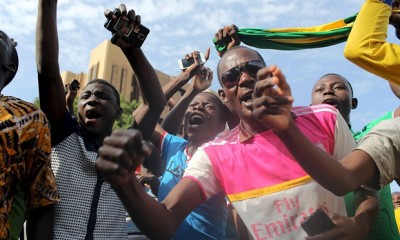If there is one thing that Burkina Faso has proved, it is that the country has an almost unlimited capacity to confound the predictions of even the most seasoned observers.
When citizens protested against then president Blaise Compaoré last year, no one expected the mass movement to work – or to see the much-feared Compaoré, who had clung to power for 27 years, retreat into exile. And last week, when the head of the presidential guard arrested the interim leadership and declared himself in charge just three weeks before planned elections, few thought that General Gilbert Diendéré would be forced out within the week.
Yet this is exactly what happened.
Emboldened by this success, the Burkinabé were not afraid to challenge the latest threat to democracy.
“The [popular protests against the coup] demonstrated that the Régiment de sécurité présidentielle [the presidential guard] did not have control over the vast majority of the country and would not be able to rule for long,” said Eloise Bertrand, a researcher from the University of Warwick and expert on Burkinabé opposition movements.
The second major factor was the resistance from the regular army, who made it clear that they were willing to act against the elite presidential guard. By ordering that Ouagadougou be surrounded, army chiefs told General Diendéré – in a language that the long-time military man would understand – that he would have to fight to maintain his grip on power.
The third reason was that Diendéré and his loyalists – who have strong ties to the Compaoré regime – were surprised by the vehemence of the continental response. The coup was instantly condemned in the strongest possible terms by the African Union (AU), while regional body the Economic Community for West African States (Ecowas) scrambled together a high-level mediation team.
“The AU considers the announcement by the military of the ‘dismissal’ of President Michel Kafando and the attempt of substituting him with ‘new authorities’ as null and void,” said the AU chairperson Nkosazana Dlamini-Zuma in a statement.
This is unusually strong language for an institution that has a reputation for hedging its bets.
Ecowas played a more direct role. It was only after talks with the Ecowas mediation team that interim president Michel Kafando was returned to office, with the mediators instrumental in persuading Diendéré to accept the deal.
“Ecowas played a highly significant role that demonstrates the potential for effective regional intervention,” said Frank Charnas, CEO of risk analysis firm Afrique Consulting. Charnas said that the Senegalese president, Macky Sall, had initially led the efforts to resolve the situation. But when civil society groups questioned his apparent willingness to grant immunity to the coup leaders, the Nigerian president, Muhammadu Buhari, took the lead.
This high-profile involvement has helped burnish Buhari’s credentials as an African statesman. “Certainly, this may aid his image with regard to foreign diplomacy … in the silent war for continental diplomatic influence between Nigeria and Ecowas, and South Africa and Sadc [the Southern African Diplomatic Community], the Burkina situation as it currently stands could be chalked up as a victory for the west Africans,” said Charnas.
David Zounmenou, a senior researcher at the Institute for Security Studies, agrees that Buhari’s role was pivotal. “Given his status as a former coup leader and now democratically elected president, [Buhari] might have been decisive in calling for the return of the interim president, and that message was directly conveyed to the coup-makers,” he said.
For Zounmenou, the peaceful resolution of the Burkina Faso situation reflects improving governance in the region as a whole. “Burkina Faso will be a reminder that coups or military intrusion can no longer be tolerated in west Africa. It is a strong signal to send coup-makers home empty handed. This is the third leader removed from power in disgrace, including Dadis Camara [Guinea], Amadou Sanogo [Mali] and now Gilbert Diendéré. Democracy has promising days ahead in the region,” he said.
In a further sign of progress in the region, Ecowas leaders narrowly failed to pass a resolution in May outlawing all third terms for presidents in the region (the move was blocked by Togo and Gambia).
Attention turns now to what happens next in Burkina Faso, where elections are tentatively planned for November.
Before they can go ahead, the country must tackle the issues which led to the short-lived coup in the first place: the outsized role of the presidential guard in government, the candidacy of members of Compaoré’s former ruling party in the upcoming poll, and impunity for officials implicated in crimes committed during Compaoré’s rule – including the death of the legendary former president Thomas Sankara, with which Diendéré has repeatedly been linked.
“It is a step in the right direction in the sense that the transition has been preserved … it shows that the Burkinabé people are still ready to defend what they fought for in 2014 and to prevent anyone from confiscating their revolution,” said Bertrand.
END



Be the first to comment